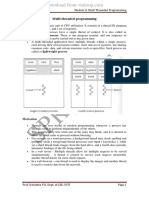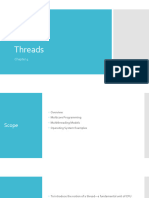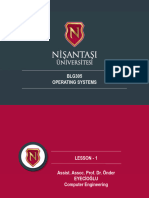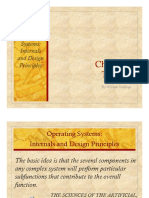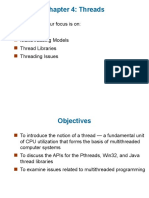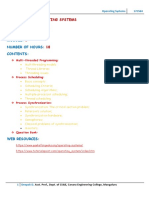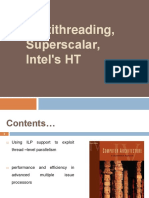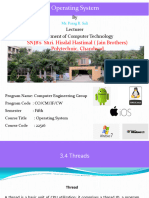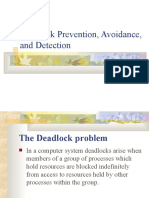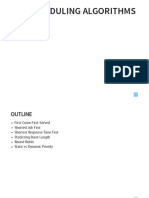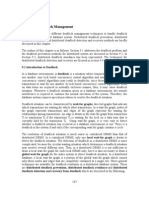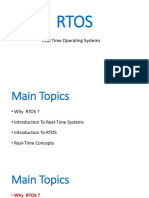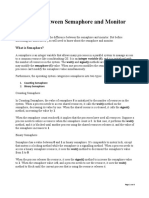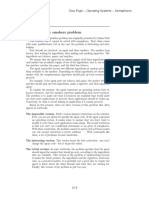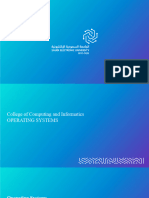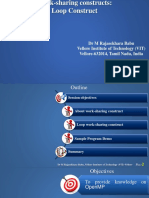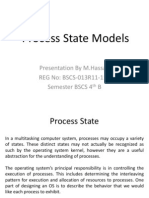0 ratings0% found this document useful (0 votes)
17 viewsChapter 6 Threads
Chapter 6 Threads
Uploaded by
zan kiutThis document discusses threads and multithreading. It begins with an overview of threads, including that a thread is the basic unit of CPU utilization and consists of a program counter, stack, and registers. It then discusses multithreading models including many-to-one, one-to-one, and many-to-many. It also covers benefits of multithreading like responsiveness, resource sharing, economy, and scalability. Thread libraries like Pthreads, Win32 threads, and Java threads are also summarized.
Copyright:
© All Rights Reserved
Available Formats
Download as PPTX, PDF, TXT or read online from Scribd
Chapter 6 Threads
Chapter 6 Threads
Uploaded by
zan kiut0 ratings0% found this document useful (0 votes)
17 views24 pagesThis document discusses threads and multithreading. It begins with an overview of threads, including that a thread is the basic unit of CPU utilization and consists of a program counter, stack, and registers. It then discusses multithreading models including many-to-one, one-to-one, and many-to-many. It also covers benefits of multithreading like responsiveness, resource sharing, economy, and scalability. Thread libraries like Pthreads, Win32 threads, and Java threads are also summarized.
Copyright
© © All Rights Reserved
Available Formats
PPTX, PDF, TXT or read online from Scribd
Share this document
Did you find this document useful?
Is this content inappropriate?
This document discusses threads and multithreading. It begins with an overview of threads, including that a thread is the basic unit of CPU utilization and consists of a program counter, stack, and registers. It then discusses multithreading models including many-to-one, one-to-one, and many-to-many. It also covers benefits of multithreading like responsiveness, resource sharing, economy, and scalability. Thread libraries like Pthreads, Win32 threads, and Java threads are also summarized.
Copyright:
© All Rights Reserved
Available Formats
Download as PPTX, PDF, TXT or read online from Scribd
Download as pptx, pdf, or txt
0 ratings0% found this document useful (0 votes)
17 views24 pagesChapter 6 Threads
Chapter 6 Threads
Uploaded by
zan kiutThis document discusses threads and multithreading. It begins with an overview of threads, including that a thread is the basic unit of CPU utilization and consists of a program counter, stack, and registers. It then discusses multithreading models including many-to-one, one-to-one, and many-to-many. It also covers benefits of multithreading like responsiveness, resource sharing, economy, and scalability. Thread libraries like Pthreads, Win32 threads, and Java threads are also summarized.
Copyright:
© All Rights Reserved
Available Formats
Download as PPTX, PDF, TXT or read online from Scribd
Download as pptx, pdf, or txt
You are on page 1of 24
Chapter 6: Threads
Overview
Multithreading Models
Threading Issues
Pthreads
Solaris 2 Threads
Windows 2000 Threads
Linux Threads
Java Threads
l
Operating System Concepts
Single and Multithreaded Processes
Operating System Concepts
Thread Overview
A thread is a basic unit of CPU utilization, consisting of a
program counter, a stack, and a set of registers, ( and a
thread ID. )
Traditional ( heavyweight ) processes have a single thread
of control - There is one program counter, and one
sequence of instructions that can be carried out at any given
time.
As shown in Figure 4.1, multi-threaded applications have
multiple threads within a single process, each having their
own program counter, stack and set of registers, but sharing
common code, data, and certain structures such as open
files
Operating System Concepts
Motivation
Threads are very useful in modern programming whenever
a process has multiple tasks to perform independently of
the others.
This is particularly true when one of the tasks may block,
and it is desired to allow the other tasks to proceed without
blocking.
For example in a word processor, a background thread may
check spelling and grammar while a foreground thread
processes user input ( keystrokes ), while yet a third thread
loads images from the hard drive, and a fourth does
periodic automatic backups of the file being edited.
Operating System Concepts
Motivation
Another example is a web server - Multiple threads allow
for multiple requests to be satisfied simultaneously,
without having to service requests sequentially or to fork
off separate processes for every incoming request.
( The latter is how this sort of thing was done before the
concept of threads was developed. A daemon would
listen at a port, fork off a child for every incoming request
to be processed, and then go back to listening to the port.
)
Operating System Concepts
Benefits
There are four major categories of benefits to multi-threading:
Responsiveness - One thread may provide rapid response while
other threads are blocked or slowed down doing intensive
calculations.
Resource sharing - By default threads share common code, data,
and other resources, which allows multiple tasks to be performed
simultaneously in a single address space.
Economy - Creating and managing threads ( and context switches
between them ) is much faster than performing the same tasks for
processes.
Scalability, i.e. Utilization of multiprocessor architectures - A single
threaded process can only run on one CPU, no matter how many
may be available, whereas the execution of a multi-threaded
application may be split amongst available processors. ( Note that
single threaded processes can still benefit from multi-processor
architectures when there are multiple processes contending for the
CPU, i.e. when the load average is above some certain threshold. )
Operating System Concepts
4 Multicore Programming
A recent trend in computer architecture is to produce chips with
multiple cores, or CPUs on a single chip.
A multi-threaded application running on a traditional single-core chip
would have to interleave the threads, as shown in Figure 4.3. and 4.4
below. On a multi-core chip, however, the threads could be spread
across the available cores, allowing true parallel processing, as
shown in Figure
For operating systems, multi-core chips require new scheduling
algorithms to make better use of the multiple cores available.
As multi-threading becomes more pervasive and more important
( thousands instead of tens of threads ), CPUs have been developed
to support more simultaneous threads per core in hardware.
Operating System Concepts
Operating System Concepts
Multithreading Models
Many-to-One
One-to-One
Many-to-Many
Operating System Concepts
Many-to-One
In the many-to-one model, many user-level threads are
all mapped onto a single kernel thread.
Thread management is handled by the thread library in
user space, which is very efficient.
However, if a blocking system call is made, then the
entire process blocks, even if the other user threads
would otherwise be able to continue.
Because a single kernel thread can operate only on a
single CPU, the many-to-one model does not allow
individual processes to be split across multiple CPUs.
Green threads for Solaris and GNU Portable Threads
implement the many-to-one model in the past, but few
systems continue to do so today.
Operating System Concepts
Many-to-One Model
Operating System Concepts
One-to-One
The one-to-one model creates a separate kernel thread
to handle each user thread.
One-to-one model overcomes the problems listed above
involving blocking system calls and the splitting of
processes across multiple CPUs.
However the overhead of managing the one-to-one
model is more significant, involving more overhead and
slowing down the system.
Most implementations of this model place a limit on how
many threads can be created.
Linux and Windows from 95 to XP implement the one-to-
one model for threads.
Operating System Concepts
One-to-one Model
Operating System Concepts
Many-to-Many Model
The many-to-many model multiplexes any number of
user threads onto an equal or smaller number of kernel
threads, combining the best features of the one-to-one
and many-to-one models.
Users have no restrictions on the number of threads
created.
Blocking kernel system calls do not block the entire
process.
Processes can be split across multiple processors.
Individual processes may be allocated variable numbers
of kernel threads, depending on the number of CPUs
present and other factors.
Operating System Concepts
Many-to-Many Model
Operating System Concepts
Thread Libraries
Thread libraries provide programmers with an API for creating
and managing threads.
Thread libraries may be implemented either in user space or in
kernel space.
The user space involves API functions implemented solely
within user space, with no kernel support. The kernel space
involves system calls, and requires a kernel with thread library
support.
There are three main thread libraries in use today:
POSIX Pthreads - may be provided as either a user or kernel
library, as an extension to the POSIX standard.
Win32 threads - provided as a kernel-level library on Windows
systems.
Java threads - Since Java generally runs on a Java Virtual
Machine, the implementation of threads is based upon whatever
OS and hardware the JVM is running on, i.e. either Pthreads or
Win32 threads depending on the system.
Operating System Concepts
Pthreads
a POSIX standard (IEEE 1003.1c) API for thread creation
and synchronization.
API specifies behavior of the thread library,
implementation is up to development of the library.
Common in UNIX operating systems.
Operating System Concepts
Threading Issues
Semantics of fork() and exec() system calls.
Thread cancellation.
Signal handling
Thread pools
Thread specific data
Operating System Concepts
Windows 2000 Threads
Implements the one-to-one mapping.
Each thread contains
- a thread id
- register set
- separate user and kernel stacks
- private data storage area
Operating System Concepts
Linux Threads
Linux refers to them as tasks rather than threads.
Thread creation is done through clone() system call.
Clone() allows a child task to share the address space of
the parent task (process)
Operating System Concepts
Java Threads
Java threads may be created by:
Extending Thread class
Implementing the Runnable interface
Java threads are managed by the JVM.
Operating System Concepts
Solaris 2 Threads
Operating System Concepts
Solaris Process
Operating System Concepts
References
Abraham Silberschatz, Greg Gagne, and Peter Baer
Galvin, "Operating System Concepts, Ninth Edition ",
Chapter 4
https://www.cs.uic.edu/~jbell/CourseNotes/
OperatingSystems/4_Threads.htm
Operating System Concepts
You might also like
- Module IIDocument145 pagesModule IIUtkarsh GuptaNo ratings yet
- What Are ThreadsDocument6 pagesWhat Are ThreadsShobha KumarNo ratings yet
- Multi Threaded Programming: Heavyweight Process. There Is One Program Counter, and One Sequence ofDocument39 pagesMulti Threaded Programming: Heavyweight Process. There Is One Program Counter, and One Sequence ofDhanyashree BNo ratings yet
- Module 2 PptosDocument145 pagesModule 2 PptosvenugopalNo ratings yet
- ThreadsDocument9 pagesThreadsMd Majedul IslamNo ratings yet
- Operating Systems:: ThreadsDocument26 pagesOperating Systems:: ThreadsKadooj 8No ratings yet
- Module4 Thread PDFDocument8 pagesModule4 Thread PDFElena MoralesNo ratings yet
- 4 OS ThreadsDocument25 pages4 OS ThreadsHanNo ratings yet
- ThreadsDocument23 pagesThreadszlatanNo ratings yet
- Threads: by Salman Memon 2K12/IT/109 University of Sindh JamshoroDocument16 pagesThreads: by Salman Memon 2K12/IT/109 University of Sindh JamshoroP VsNo ratings yet
- ThreadsDocument10 pagesThreadsSharlin Lins LNo ratings yet
- Module 2Document44 pagesModule 2shreya halaswamyNo ratings yet
- OS MOD - 2 NotesDocument44 pagesOS MOD - 2 NotesSHALINI KGNo ratings yet
- 7th Lecture OSDocument24 pages7th Lecture OSFarhan KhurshidNo ratings yet
- Chapter 1: Multi Threaded Programming: (Operating Systems-18Cs43)Document39 pagesChapter 1: Multi Threaded Programming: (Operating Systems-18Cs43)Vaishak kamathNo ratings yet
- Chapter 4: Threads: Silberschatz, Galvin and Gagne ©2009 Operating System Concepts - 8 EditionDocument29 pagesChapter 4: Threads: Silberschatz, Galvin and Gagne ©2009 Operating System Concepts - 8 EditionWaqas WattooNo ratings yet
- OS Module-2 (Highlighted)Document43 pagesOS Module-2 (Highlighted)pslg.0119No ratings yet
- BLG305 Ders4-EnDocument34 pagesBLG305 Ders4-Enlux.conc.youtNo ratings yet
- Threads Chapter4Document51 pagesThreads Chapter4Kashish JainNo ratings yet
- Chapter 4: ThreadsDocument33 pagesChapter 4: ThreadsAnas JavaidNo ratings yet
- 4 ThreadsDocument17 pages4 ThreadsPrajwal KandelNo ratings yet
- Chapter 4: Threads: in This Chapter Our Focus Is On: Multithreading Models Thread Libraries Threading IssuesDocument23 pagesChapter 4: Threads: in This Chapter Our Focus Is On: Multithreading Models Thread Libraries Threading IssuesSanjeev RNo ratings yet
- 21CS44 - Operating Systems - Module-2Document44 pages21CS44 - Operating Systems - Module-2sumitashetty19No ratings yet
- Software Requirements Specification SrsDocument34 pagesSoftware Requirements Specification Srsawais sarwarNo ratings yet
- 5TH Operating System NotesDocument8 pages5TH Operating System NotesNeha ChinniNo ratings yet
- Operating Systems - ch5-F06Document26 pagesOperating Systems - ch5-F06Ahmad ShdifatNo ratings yet
- Chapter 4: Threads: in This Chapter Our Focus Is On: Multithreading Models Thread Libraries Threading IssuesDocument23 pagesChapter 4: Threads: in This Chapter Our Focus Is On: Multithreading Models Thread Libraries Threading IssuesSanjeev RNo ratings yet
- Os - Module 2Document44 pagesOs - Module 2farha anjumNo ratings yet
- Operating System - Multi-ThreadingDocument7 pagesOperating System - Multi-ThreadingHeo Công NghệNo ratings yet
- Operating Systems - Ch4 - Mod - ReemDocument21 pagesOperating Systems - Ch4 - Mod - ReemReema AmgadNo ratings yet
- ThreadsDocument16 pagesThreadscigila6437No ratings yet
- ThreadDocument7 pagesThreadAlijan JanNo ratings yet
- Operating Systems: Suad AlaofiDocument13 pagesOperating Systems: Suad AlaofiAmal FahadNo ratings yet
- ThreadsDocument24 pagesThreadsAjay Kumar RNo ratings yet
- Module 2Document44 pagesModule 2Gagana.mNo ratings yet
- Processes Two Parts To A Process: An Instance of A Program in ExecutionDocument3 pagesProcesses Two Parts To A Process: An Instance of A Program in Executionajlul gamingNo ratings yet
- ThreadsDocument8 pagesThreadsAbdullah DaraNo ratings yet
- Chapter 2 Process Management Part 2 Threads and MultithreadingDocument42 pagesChapter 2 Process Management Part 2 Threads and Multithreadingamanterefe99No ratings yet
- Module 2-1Document21 pagesModule 2-1nida61325No ratings yet
- Unit 5Document29 pagesUnit 5Vanathi PriyadharshiniNo ratings yet
- OS Lecture4Document20 pagesOS Lecture4adiasaraf29No ratings yet
- Lec 4 Superscalarprocessor Updated PDFDocument40 pagesLec 4 Superscalarprocessor Updated PDFMuhammad ImranNo ratings yet
- Lec 4 Superscalarprocessor PDFDocument23 pagesLec 4 Superscalarprocessor PDFMuhammad ImranNo ratings yet
- Chapter#03 - Threads & Multithreading ConceptDocument32 pagesChapter#03 - Threads & Multithreading ConceptManzar AliNo ratings yet
- ch4 ThreadDocument29 pagesch4 Threaddasexe7067No ratings yet
- ThreadsDocument2 pagesThreadsharshimogalapalliNo ratings yet
- Thread (Computing) : A Process With Two Threads of Execution, Running On One ProcessorDocument9 pagesThread (Computing) : A Process With Two Threads of Execution, Running On One ProcessorGautam TyagiNo ratings yet
- Threads: 6.1 Overview 6.2 Multithreading Models 6.3 Operating System ExamplesDocument7 pagesThreads: 6.1 Overview 6.2 Multithreading Models 6.3 Operating System ExamplesCojanu CozminNo ratings yet
- CH 4Document16 pagesCH 4Maryam FatimaNo ratings yet
- O.S - Theory Assignment 02Document7 pagesO.S - Theory Assignment 02Haadi KhanNo ratings yet
- OS Multi-Threading ConceptsDocument25 pagesOS Multi-Threading Conceptsbtsarmyforeversince2020No ratings yet
- University Institute of Engineering Bachelor of Engineering (Computer Science & Engineering) Operating System (CST-328)Document21 pagesUniversity Institute of Engineering Bachelor of Engineering (Computer Science & Engineering) Operating System (CST-328)puja1002.hrNo ratings yet
- Lecture 03Document62 pagesLecture 03browninasiaNo ratings yet
- CH 4 (Threads)Document8 pagesCH 4 (Threads)Muhammad ImranNo ratings yet
- Tutorial 4 Solution - OSDocument6 pagesTutorial 4 Solution - OSUnknown UnknownNo ratings yet
- ThreadDocument11 pagesThreadNilesh kumar kamalNo ratings yet
- It Is The ThreadDocument17 pagesIt Is The Threadbhageshnarnawareg1No ratings yet
- CISC 341 L04 - ThreadsDocument12 pagesCISC 341 L04 - ThreadsKwame kusi SarpongNo ratings yet
- Node.js, JavaScript, API: Interview Questions and AnswersFrom EverandNode.js, JavaScript, API: Interview Questions and AnswersRating: 5 out of 5 stars5/5 (1)
- Unit 3 - Java Programming - WWW - Rgpvnotes.inDocument32 pagesUnit 3 - Java Programming - WWW - Rgpvnotes.inbosoho4313No ratings yet
- FCFS (First Come First Serve) CPU SchedulingDocument3 pagesFCFS (First Come First Serve) CPU SchedulingBiju AngaleesNo ratings yet
- Par Proc BookDocument400 pagesPar Proc BookangeldandruffNo ratings yet
- Chapter 10Document72 pagesChapter 10Sandesh BasnetNo ratings yet
- CSC 271 - Software I: Utilities and Internals: Lecture 11: Processes and ProgrammingDocument25 pagesCSC 271 - Software I: Utilities and Internals: Lecture 11: Processes and ProgrammingHiba AlshaweshNo ratings yet
- Deadlock Prevention, Avoidance, and DetectionDocument29 pagesDeadlock Prevention, Avoidance, and DetectionSayandeepNo ratings yet
- Power Off Reset ReasonDocument3 pagesPower Off Reset Reason1989 DavidNo ratings yet
- Course File OSDocument18 pagesCourse File OSMukesh KumarNo ratings yet
- SettingsproviderDocument14 pagesSettingsprovider1989 DavidNo ratings yet
- Scheduling AlgorithmsDocument20 pagesScheduling Algorithmsteyik ayeNo ratings yet
- Distributed Database Management Notes - 2Document14 pagesDistributed Database Management Notes - 2Saurav Kataruka100% (3)
- Distributed ComputingDocument3 pagesDistributed Computingsafiullah shahNo ratings yet
- RTOSDocument152 pagesRTOSMohamedYounesNo ratings yet
- Transaction Processing Concepts: GoalsDocument10 pagesTransaction Processing Concepts: GoalsMhackSahuNo ratings yet
- Process SynchronizationDocument49 pagesProcess SynchronizationTejaas MageshNo ratings yet
- Multithreading in JavaDocument24 pagesMultithreading in JavaMalliKarjunNo ratings yet
- OS Module 3 Process Coordination and DeadlockDocument167 pagesOS Module 3 Process Coordination and DeadlockEYASHITA SINGH 20BCD7027No ratings yet
- What HappenedDocument1 pageWhat HappenedhelloNo ratings yet
- Data Sasaran SMPDocument122 pagesData Sasaran SMPSyahdan HudaNo ratings yet
- Difference Between Semaphore and MonitorDocument8 pagesDifference Between Semaphore and MonitorMohamedChiheb BenChaabaneNo ratings yet
- Chapter: Threads: Silberschatz, Galvin and Gagne ©2009 Operating System Concepts - 8 EditionDocument49 pagesChapter: Threads: Silberschatz, Galvin and Gagne ©2009 Operating System Concepts - 8 Editionasif rafiqueNo ratings yet
- My Semaphore Examples MoeDocument13 pagesMy Semaphore Examples MoeGözde NurNo ratings yet
- Cours 08 PthreadsDocument90 pagesCours 08 PthreadsVeriaktar VeriaktaroğluNo ratings yet
- OS MergedDocument97 pagesOS MergedShubham JainNo ratings yet
- Module 3 - CPU SchedulingDocument42 pagesModule 3 - CPU SchedulingKailashNo ratings yet
- Work-Sharing Constructs Loop ConstructDocument9 pagesWork-Sharing Constructs Loop ConstructVariable 14No ratings yet
- Concurrency Control & RecoveryDocument39 pagesConcurrency Control & RecoverySantosh SinghNo ratings yet
- Process StatesDocument12 pagesProcess StatesHassan ShafiqueNo ratings yet
- Advanced Database Management Systems: Assignment 01Document8 pagesAdvanced Database Management Systems: Assignment 01Akalanka DissanayakeNo ratings yet
- Java MultithreadingDocument23 pagesJava Multithreadingm tousifNo ratings yet



